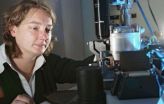(Press-News.org) Jena (21 October 2010) Scientists from the Friedrich-Schiller-University Jena (Germany) were successful in improving a fabrication process for Atomic Force Microscopy (AFM) probe tips.
Atomic Force Microscopy is able to scan surfaces so that even tiniest nano structures become visible. Knowledge about these structures is for instance important for the development of new materials and carrier systems for active substances. The size of the probe is highly important for the image quality as it limits the dimensions that can be visualized – the smaller the probe, the smaller the structures that are revealed.
Carbon nanotubes are supposed to be a superior material for the improvement of such scanning probes. However, it is difficult to attach them on scanning probes, which limits their practical use.
Chemists of the Friedrich-Schiller-University Jena found a way to overcome these problems. The research team of Prof. Dr. Ulrich S. Schubert succeeded in developing a new type of process that allows the growth of carbon nanotubes on the actual scanning probe. These innovative discoveries are published in the leading scientific journal for Nano Science, Nano Letters and are available online under (http://pubs.acs.org/doi/pdf/10.1021/nl101934).
For this process the Jena scientists are using microwave radiation for a gentle but very fast growth of the nanotubes. The growth starts at small cobalt particles, that are being taken up with the help of the AFM tip. "The metal particles strongly heat up in the microwave and reach a temperature that is sufficient to convert alcohol vapor into carbon. The heating process works similar like a forgotten spoon in the kitchen microwave which also absorbs the microwave radiation very effectively," explains Tamara Druzhinina from Schubert`s research team. "Carbon nanotubes can be grown very quickly due to the special conditions inside of the microwave which can generate a pressure up to 20 bar" adds her colleague Dr. Stephanie Hoeppener.
The Jena chemist Prof. Schubert points out the practical benefits of the process: "The method we developed can potentially result in a very cost-efficient production technology of for instance high resolution probes for Scanning Force Microscopy. These are already available on the market but they are very expensive at 350 Euro each. With the process we can reach a price level, that would justify the use of such tips also just for routine measurements."
INFORMATION:
Contact:
Dr. Stephanie Hoeppener / Prof. Dr. Ulrich S. Schubert
Institute of Organic Chemistry and Macromolecular Chemistry
Friedrich-Schiller-University Jena
Humboldtstr. 10
D-07743 Jena
Phone: +49 (0) 3641 / 948261 or 948201
Email: s.hoeppener[at]uni-jena.de / info[at]schubert-group.de
Publication:
Tamara S. Druzhinina, Stephanie Hoeppener, Ulrich S. Schubert: „Microwave-Assisted Fabrication of Carbon Nanotube AFM Tips", DOI: 10.1021/nl101934j
Preliminary Publication in Nano Letters available under: http://pubs.acs.org/doi/pdf/10.1021/nl101934j
AFM tips from the microwave
Chemists from the Jena University improve the process for the fabrication of sharp atomic force microscopy tips
2010-10-22
ELSE PRESS RELEASES FROM THIS DATE:
Pitt researchers: Plant-based plastics not necessarily greener than oil-based relatives
2010-10-22
PITTSBURGH—An analysis of plant and petroleum-derived plastics by University of Pittsburgh researchers suggests that biopolymers are not necessarily better for the environment than their petroleum-based relatives, according to a report in Environmental Science & Technology. The Pitt team found that while biopolymers are the more eco-friendly material, traditional plastics can be less environmentally taxing to produce.
Biopolymers trumped the other plastics for biodegradability, low toxicity, and use of renewable resources. Nonetheless, the farming and chemical processing ...
Smaller is better in the viscous zone
2010-10-22
DURHAM, N.C. -- Being the right size and existing in the limbo between a solid and a liquid state appear to be the secrets to improving the efficiency of chemical catalysts that can create better nanoparticles or more efficient energy sources.
When matter is in this transitional state, a catalyst can achieve its utmost potential with the right combination of catalyst particle size and temperature, according to a pair of Duke University researchers. A catalyst is an agent or chemical that facilitates a chemical reaction. It is estimated that more than 90 percent of chemical ...
Carnegie Mellon researchers break speed barrier in solving important class of linear systems
2010-10-22
PITTSBURGH—Computer scientists at Carnegie Mellon University have devised an innovative and elegantly concise algorithm that can efficiently solve systems of linear equations that are critical to such important computer applications as image processing, logistics and scheduling problems, and recommendation systems.
The theoretical breakthrough by Professor Gary Miller, Systems Scientist Ioannis Koutis and Ph.D. student Richard Peng, all of Carnegie Mellon's Computer Science Department, has enormous practical potential. Linear systems are widely used to model real-world ...
Light on silicon better than copper?
2010-10-22
DURHAM, N.C. -- Step aside copper and make way for a better carrier of information -- light.
As good as the metal has been in zipping information from one circuit to another on silicon inside computers and other electronic devices, optical signals can carry much more, according to Duke University electrical engineers. So the engineers have designed and demonstrated microscopically small lasers integrated with thin film-light guides on silicon that could replace the copper in a host of electronic products.
The structures on silicon not only contain tiny light-emitting ...
Too many sisters affect male sexuality
2010-10-22
Growing up with lots of sisters makes a man less sexy. For rats, anyway. A new study published in Psychological Science, a journal of the Association for Psychological Science, finds that the sex ratio of a male rat's family when he's growing up influences both his own sexual behavior and how female rats respond to him.
David Crews, a psychobiologist at the University of Texas at Austin, is interested in how early life affects behavior later. This is an area that has received a lot of attention recently, such as research showing that the position of a fetus in the uterus ...
Strategies for translational research in the UK
2010-10-22
A commentary published in the journal, Science Translational Medicine, examines the structures of translational research investment in the UK.
The commentary has been written by researchers from the National Institute for Health Research (NIHR) comprehensive Biomedical Research Centre (BRC) at Guy's and St Thomas' and King's College London. The authors consider the results of substantial Government and charitable investment in translational research taking place within the NHS.
The commentary follows the progress of the research and development funding streams available ...
Poor start in life need not spell doom in adulthood
2010-10-22
RIVERSIDE, Calif. – Does the environment encountered early in life have permanent and predictable long-term effects in adulthood? Such effects have been reported in numerous organisms, including humans.
But now a biology graduate student at the University of California, Riverside reports that how individuals fare as adults is not simply a passive consequence of the limits that early conditions may impose on them. Studying how adult Trinidadian guppies (small freshwater fish) responded to their early food conditions, Sonya Auer found that the guppies had compensated ...
Researchers find better method to help mothers cope with child's cancer and related stress
2010-10-22
VIDEO:
Martha Askins explains problem-solving skills training.
Click here for more information.
BOSTON - Mothers who have children diagnosed with cancer now have a better approach to address and cope with stresses associated with their child's disease.
A new certified intervention has proven to be more effective long term compared to other psychological methods, as reported today at the 42nd Congress of the International Society of Pediatric Oncology.
In a joint ...
Study finds airbags reduce risk of kidney injury in car crashes
2010-10-22
CHICAGO (October 21, 2010) – Occupants in motor vehicles with airbags are much less likely to suffer kidney or renal damage in a crash than are occupants in vehicles without airbags, according to a new study in the September Journal of the American College of Surgeons.
Little is known about how to prevent or reduce injury to solid organs from motor vehicle collisions. In fact, this study is the first to evaluate the protective effect of airbags on a specific organ system – in this case, the kidney and other renal, or upper urinary tract, organs.
The researchers found ...
Telementoring may address need for surgical subspecialty expertise in remote locations
2010-10-22
CHICAGO (October 21, 2010) – Telementoring may be an effective way for subspecialist surgeons to assist remotely located general surgeons in the care of patients in need of emergency subspecialty surgical procedures, according to new research findings published in the September issue of the Journal of the American College of Surgeons.
In the study, eight general surgery residents with no formal subspecialty training participated in three mock operations using animal cadavers intended to simulate live procedures. When telementored, the residents achieved higher overall ...
LAST 30 PRESS RELEASES:
ACES marks 150 years of the Morrow Plots, our nation's oldest research field
Physicists open door to future, hyper-efficient ‘orbitronic’ devices
$80 million supports research into exceptional longevity
Why the planet doesn’t dry out together: scientists solve a global climate puzzle
Global greening: The Earth’s green wave is shifting
You don't need to be very altruistic to stop an epidemic
Signs on Stone Age objects: Precursor to written language dates back 40,000 years
MIT study reveals climatic fingerprints of wildfires and volcanic eruptions
A shift from the sandlot to the travel team for youth sports
Hair-width LEDs could replace lasers
The hidden infections that refuse to go away: how household practices can stop deadly diseases
Ochsner MD Anderson uses groundbreaking TIL therapy to treat advanced melanoma in adults
A heatshield for ‘never-wet’ surfaces: Rice engineering team repels even near-boiling water with low-cost, scalable coating
Skills from being a birder may change—and benefit—your brain
Waterloo researchers turning plastic waste into vinegar
Measuring the expansion of the universe with cosmic fireworks
How horses whinny: Whistling while singing
US newborn hepatitis B virus vaccination rates
When influencers raise a glass, young viewers want to join them
Exposure to alcohol-related social media content and desire to drink among young adults
Access to dialysis facilities in socioeconomically advantaged and disadvantaged communities
Dietary patterns and indicators of cognitive function
New study shows dry powder inhalers can improve patient outcomes and lower environmental impact
Plant hormone therapy could improve global food security
A new Johns Hopkins Medicine study finds sex and menopause-based differences in presentation of early Lyme disease
Students run ‘bee hotels’ across Canada - DNA reveals who’s checking in
SwRI grows capacity to support manufacture of antidotes to combat nerve agent, pesticide exposure in the U.S.
University of Miami business technology department ranked No. 1 in the nation for research productivity
Researchers build ultra-efficient optical sensors shrinking light to a chip
Why laws named after tragedies win public support
[Press-News.org] AFM tips from the microwaveChemists from the Jena University improve the process for the fabrication of sharp atomic force microscopy tips




